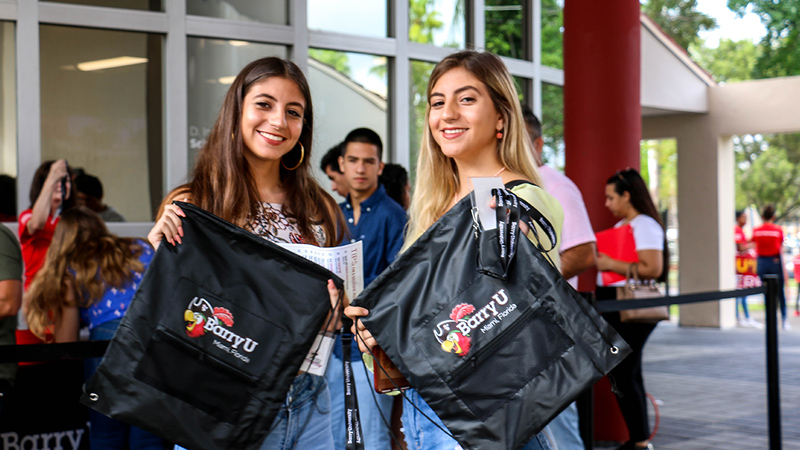Congratulations to Dr. Bartosz “Bart” Fornal and his project team on a successful grant proposal to the National Science Foundation! To be awarded, applicants must demonstrate high standards of teaching, mentoring, scholarship, and sustained commitment to service, and Dr. Fornal — a newly-hired assistant professor of physics at Barry University — is certainly no exception. An expert in theoretical particle physics, he loves to spark curiosity about how the world works with students of all ages and interests, and his research project, “Searching for the Dark Side of the Universe with Gravitational Waves,” is bound to do just that.
Originally from Poland, Dr. Fornal’s impressive experience and education has led to him collaborating extensively on several peer-reviewed studies regarding gravitational waves, dark matter, and particle physics. His dozens of scholarly publications in these areas have been widely-circulated by media outlets like the Financial Times, Physics World, Scientific American, Quanta Magazine, and the Los Angeles Times. When he’s not conducting, publishing, or presenting his research around the globe, Dr. Fornal devotes his time to mentoring budding physicists. In addition to teaching core curriculum courses and overseeing undergraduate research projects, he travels regularly to take part in university and high school events aimed at making science approachable and engaging. Since earning his Ph.D. in 2014 from the California Institute of Technology (Caltech), Dr. Fornal has held postdoctoral fellowships at the University of California, Irvine, the University of California, San Diego, and the University of Utah, and at each institution he collaborated with renowned research teams on subjects like gravitational waves, dark matter, and the lifespan of neutrons. Dr. Fornal is currently affiliated with the Laser Interferometer Gravitational-Wave Observatory (LIGO) — a world-renowned Scientific collaboration — through the University of Utah, and is in the process of applying to become a Senior member. On top of that, he intends to make Barry University an official LIGO Scientific partner, which will raise the reputation of Barry in the physics community and beyond.
“Bart is very enthusiastic about hands-on activities for students,” says Dr. Maurizio Giannotti, a Barry professor of physics whose own award-winning work complements Dr. Fornal’s. “He’s a very talented teacher who can explain difficult concepts in easy terms and with relevant examples. We’ve had a lot of discussions on how to bring new ideas to Barry University and on how to involve students in relevant research topics.” We’re excited about the research opportunities this project will create for our math and science majors at Barry, and the word about Dr. Fornal’s research is already spreading quickly through our STEM departments! The establishment of a physics major is a long-term goal of our department, and a research project like this one is sure to drum up some interest in students.
According to the proposal, “this research project encapsulates the essence of our quest to discover the truth about the Universe.” Gravitational waves were only recently detected — one hundred years after being predicted by Einstein’s theory of general relativity — initiating a golden age for gravitational wave astronomy. The upcoming years will bring many new exciting data, especially with the new generation of gravitational wave detectors, and this project will focus on investigating how this data may be used to shed light on the outstanding mysteries in particle physics.
Particle physics is the most fundamental of all branches of physics, attempting to answer the deepest questions about Nature’s basic building blocks and how they interoperate. So far, the best description of our world is provided by the Standard Model of elementary particles, which explains remarkably well the evolution of the Universe starting from around one-trillionth of a second after the Big Bang up to the present time. The theory was formulated 50 years ago and successfully verified in experiments thereafter, with the final piece of the puzzle being added in 2012 with the discovery of the Higgs boson at the Large Hadron Collider at CERN in Switzerland. Nevertheless, despite these huge successes, several fundamental questions remain unanswered, with some of the most pressing open issues concerning: dark matter, the matter/anti-matter asymmetry of the Universe, and the origin of neutrino masses. Combined with a positive signal from gravitational wave detectors, the results of this project would provide a breakthrough in how we understand the structure of the Universe!
In addition to the project’s scientific impact, one of its practical goals is to introduce undergraduate students — many from groups that are underrepresented in STEM disciplines — to ideas in particle physics, as well as providing them with knowledge and skills essential to becoming future researchers or highly-specialized professionals. Although the Department of Chemistry and Physics has a strong history of students in chemistry research co-authoring publications with faculty and presenting at national conferences, only several students have participated in physics research in the department so far — which is something Dr. Fornal hopes to change soon. Students involved in the research will be paid for their time, receive training in research, and acquire skills that can prepare them for advanced-degree programs in science, increase their competitiveness in the job market, and improve their admission rate into doctoral programs.
Barry University is committed to supporting Dr. Fornal’s research by dedicating our facilities, software, faculty, and undergraduate students to assist with the project. The Office of Grants & Sponsored Programs at Barry — specifically Dr. Tamara Hamilton, Michelle Gooding, and Staycie Gabelus — has already been very supportive to the team, with thorough professional assistance in the administrative and financial aspects of the application. Dr. Zuzana Zajickova, Professor of Chemistry and Chair of the department, said of the project, “This grant will not only provide early-career research support for Dr. Fornal, but also an opportunity for our students to engage in world-renowned research and shape their identities as collaborative, creative and sensible researchers and life-long learners.” We’re very proud to have Dr. Fornal on our team, and we can’t wait to see how this project will enrich our students’ lives!



















